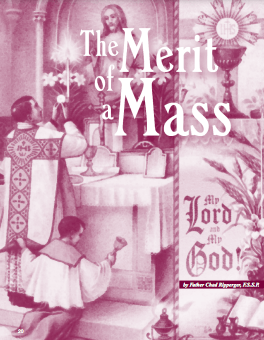Excerpt republished with permission.
Many believe that they derive more spiritual gain from the old rite of Mass than from the new. However, to give a more precise expression to the intuitive sense of which is more efficacious, the new or the old rite, it is necessary to make several distinctions. Since the purpose of this article is very specific, i.e. to ascertain which ritual is more meritorious or efficacious, certain issues regarding the value or efficacy of the Mass will be avoided.
Yet, to answer the question of whether the old rite of Mass is more efficacious than the new is of paramount importance. It is the point of departure between priests of the respective rites, since each holds that he is saying the Mass that is best for the faithful.
Nevertheless, the question is a key one since, in the end, whichever ritual is more meritorious ought to be the one that the Roman authorities encourage. Since one of the primary obligations of those in authority in the Church is the glory of God through the salvation of souls, they have the obligation to encourage and, in some cases, require the ritual of the Mass which is most efficacious.
Distinctions of Merit
The distinctions within the different kinds of merit of the Mass are first founded on a distinction between intrinsic and extrinsic merit or value. The Catholic Encyclopedia says:
We must also sharply distinguish between the intrinsic and the extrinsic value of the Mass (valor intrinsecus, extrinsecus). As for its intrinsic value, it seems beyond doubt that, in view of the infinite worth of Christ as the Victim and High Priest in one Person, the sacrifice must be regarded as of infinite value, just as the sacrifice of the Last Supper and that of the Cross.
…But when we turn to the Mass as a sacrifice of impetration and expiation, the case is different. While we must always regard its intrinsic value as infinite, since it is the sacrifice of the God-Man Himself, its extrinsic value must necessarily be finite in consequence of the limitations of man. The scope of the so-called “fruits of the Mass” is limited.
In discussing the value of the Mass, one must make a distinction between intrinsic and the extrinsic value. The intrinsic value of any valid Mass is infinite since It is Christ, Who is infinite, Who is offered. Hence, in this respect every Mass has an infinite value. The new rite of Mass is just as efficacious as the old rite of Mass in this respect since they are both the same sacrifice of Christ. The Mass, because it is the offering of God the Son to God the Father, gives infinite glory to God.
However, the extrinsic value or merit of the Mass is finite. This is so because man, a finite creature, is incapable of receiving infinite effects. In this respect, the value of the Mass is “intensive limited,” which means that the fruit of the Mass is limited in its measure. Normally, the liturgical writers state that, as to its impetratory and expiatory value, the Mass is finite, “since the operations of propitiation and impetration refer to human beings, who as creatures can receive a finite act only.” When one considers the actual sacrifice of the Mass, which is the sacrifice of Calvary, it is infinite, but as to its effects, other than the infinite effect of giving God glory, it is finite.
In addition to man’s finitude, the liturgical writers give other reasons for the limitation of the extrinsic value of the Mass. While the Mass is infinite as to What is sacrificed, nevertheless we derive only finite fruits from the Mass. The writers say that the extrinsic merit of the Mass is based essentially upon six things. These six things are intermediaries between the infinite efficaciousness of the Mass and those who receive the actual effects from the Mass


